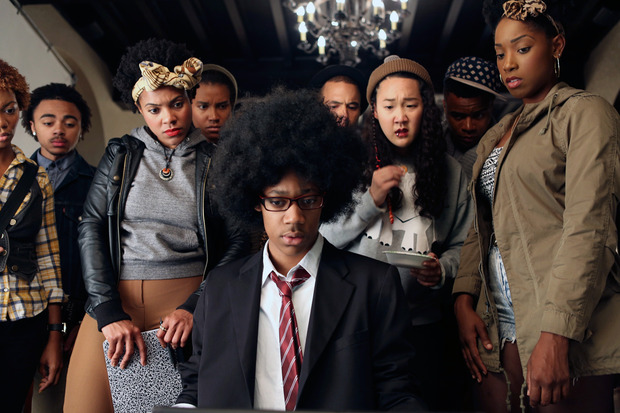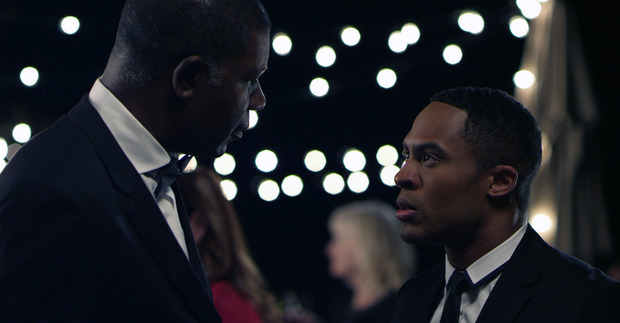Sundance 2014: Kathryn Bostic
The composer of festival favorite “Dear White People” discusses her work and the film


A good score can unite a film, subtly enhancing key moments with flourishes to emotional beats or linking transitions elsewhere. There’s a refined balance between making the music powerful enough to be felt and resonant, while providing something in service to one of the most collaborative creative processes—filmmaking. Musician Kathryn Bostic—a singer/songwriter and composer for stage and screen—mastered the craft and has demonstrated this with her illuminating new work for the Park City favorite “Dear White People,” one of 17 films in the Dramatic Competition.
You’d be hard pressed to find a film as talked about at Sundance, and as deserving of all the chatter, as “Dear White People.” The dark satire even won this year’s Special Jury Award for Breakthrough Talent. This feature marks director Justin Simien’s debut, began as a spoof Twitter account and a viral concept trailer, and was ultimately funded by the crowd-sourcing platform IndieGogo. With a strong cast, clear and potent direction and a thoughtful, sharp and too real understanding of racism at Ivy League schools, the entire film packs a punch.

The film draws upon some of Simien’s experiences at school, where he was met with many misconceptions and assumptions. At Winchester University, a fictional Ivy League campus, a biracial student who hosts a radio show aimed at outing racist behavior finds herself at a mostly African American residence hall. This spurns even stronger, more forceful commentary as she blasts ignorance, radical reactionary language and behavior and even the misguided politics of the teachers and leaders who are supposed to be helping. She isn’t the only one going through this—a rich cast of characters, from a journalist to the dean’s son are also working their way through it all. It’s when a racist costume party commences (actually inspired by a real event) that race relations reach their peak.

Linking the provoking narrative throughout, you hear Bostic’s work. “I got involved with ‘Dear White People’ through working with the director Justin Simien on an earlier project,” the composer explains. “The executive producer for ‘Dear White People,’ Stephanie Allain Bray made the initial introduction between myself and Justin. He had also heard my score in Ava DuVernay’s film ‘Middle of Nowhere‘ [which won the 2012 Sundance Best Director award] and was interested in meeting me. He then asked me to work with him on a PSA he was directing. We had a good collaboration on that and stayed in touch.” Simien would reach out to Bostic during the production of “Dear White People” and she soon came on board as the film’s composer.
Bostic has received several prestigious fellowships from Sundance, BMI, and ASCAP/Disney in a variety of categories, from conducting to musical theatre. Her score for the critically acclaimed Broadway production “Bengal Tiger at the Baghdad Zoo” starring Robin Williams garnered a 2011 Drama Desk nomination. On top of composing music for PBS and ITVS documentaries, indie films and theatre productions, Bostic helms her own music production company Blue Mandala Music.
As vast her body of work, it’s mood and emotion she sets out to impact: “When I’m scoring a film, or theater project for that matter, I want to create the best mood for the emotional intention of the scene involved. I want to have themes that help realize the characters and the overall storyline. Film scoring, for me, is very much like songwriting except that there’s a visual element. They are both telling a story to engage an audience with something that will hopefully resonate with them.”

Bostic states that the score was Simien’s vision, completely. She notes that it’s “a diverse range of hip-hop, classical, and jazz. This diversity is great in reflecting aspects of the storyline.” The creative depth and breadth of the score, with its myriad of musical influences, may come as a surprise to some. “A modern day college-themed storyline that has all these elements isn’t necessarily what people would expect to hear and yet it resembles a lot of the nuances and complexities of how we perceive of each other and how we relate to each other.” Altogether, Bostic felt it was great to work on “because I grew up listening to this: Beethoven, Stravinsky, McCoy Tyner, Miles Davis, Grandmaster Flash, Naughty by Nature, The Fugees. I love that Simien’s instincts were so diverse for the music in this film.”
Musical diversity is just the tip of the iceberg for the project, according to Bostic: “I really appreciate Justin Simien’s desire to tell this story and find a platform to do so in his film. It’s a very thought-provoking conversation about identity, race and the complexities that go along with basic self-awareness and growth.” For Bostic, it was a valuable opportunity and her underlying respect for the director made the project an easy one: “As an artist I really appreciate collaborating with visionary and cutting-edge creative people. I am always on the look out for projects that will fuel my instincts and innovation.”
Portrait image courtesy of Kiino Villand, screenshots courtesy of “Dear White People”












